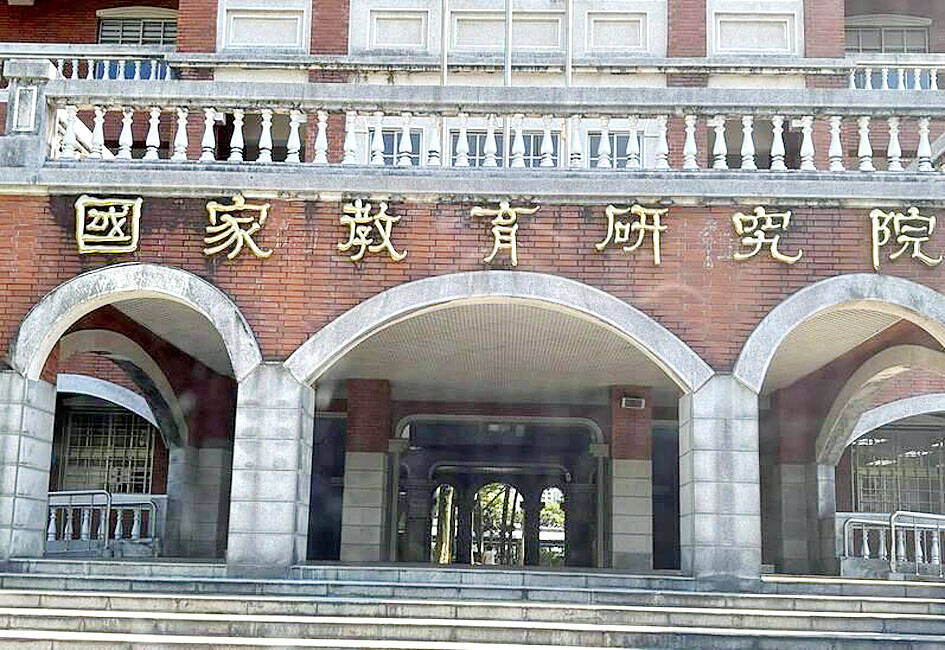About 69 percent of ninth-graders use artificial intelligence (AI), most commonly for homework, creating images or videos, and chatting, a survey found yesterday.
The poll was conducted by the National Academy of Educational Research (NAER) and Academia Sinica as part of the Taiwan Assessment of Student Achievement Longitudinal Study.
Asked about AI, 94.2 percent of the students knew what generative AI was, although 31 percent said that they had never used it, the survey showed.

Photo: Rachel Lin, Taipei Times
Among those who said that they used generative AI, 6.8 percent used it daily, 3.9 percent used it five to six times per week, 12.2 percent three to four times per week and 46 percent used it once or twice a week, the survey found.
About 53.2 percent of ninth-graders said that teachers had taught them how to use generative AI, while 46.8 percent said their teachers did not, suggesting that the adoption rate of the technology could continue to improve.
Students said they used AI for homework, translation, research and content creation, indicating that the technology has already become a part of their studies and daily habits across academic and creative interests.
This could reflect how younger, digitally native groups are more amenable to new technologies, and points to a growing trend of using AI in a balanced way, the NAER said.
The gap between those who are aware of AI and those who use it suggests that most are not becoming advanced or heavy users, it said.
As about half of schools are teaching students how to use AI, it suggests that teachers recognize how important the technology is becoming, the NAER said, adding that the wide array of ways in which students use AI tools also shows its wide-ranging capability and potential.

NATIONAL SECURITY THREAT: An official said that Guan Guan’s comments had gone beyond the threshold of free speech, as she advocated for the destruction of the ROC China-born media influencer Guan Guan’s (關關) residency permit has been revoked for repeatedly posting pro-China content that threatens national security, the National Immigration Agency said yesterday. Guan Guan has said many controversial things in her videos posted to Douyin (抖音), including “the red flag will soon be painted all over Taiwan” and “Taiwan is an inseparable part of China,” while expressing hope for expedited “reunification.” The agency received multiple reports alleging that Guan Guan had advocated for armed reunification last year. After investigating, the agency last month issued a notice requiring her to appear and account for her actions. Guan Guan appeared as required,

A strong cold air mass is expected to arrive tonight, bringing a change in weather and a drop in temperature, the Central Weather Administration (CWA) said. The coldest time would be early on Thursday morning, with temperatures in some areas dipping as low as 8°C, it said. Daytime highs yesterday were 22°C to 24°C in northern and eastern Taiwan, and about 25°C to 28°C in the central and southern regions, it said. However, nighttime lows would dip to about 15°C to 16°C in central and northern Taiwan as well as the northeast, and 17°C to 19°C elsewhere, it said. Tropical Storm Nokaen, currently

‘NATO-PLUS’: ‘Our strategic partners in the Indo-Pacific are facing increasing aggression by the Chinese Communist Party,’ US Representative Rob Wittman said The US House of Representatives on Monday released its version of the Consolidated Appropriations Act, which includes US$1.15 billion to support security cooperation with Taiwan. The omnibus act, covering US$1.2 trillion of spending, allocates US$1 billion for the Taiwan Security Cooperation Initiative, as well as US$150 million for the replacement of defense articles and reimbursement of defense services provided to Taiwan. The fund allocations were based on the US National Defense Authorization Act for fiscal 2026 that was passed by the US Congress last month and authorized up to US$1 billion to the US Defense Security Cooperation Agency in support of the

PAPERS, PLEASE: The gang exploited the high value of the passports, selling them at inflated prices to Chinese buyers, who would treat them as ‘invisibility cloaks’ The Yilan District Court has handed four members of a syndicate prison terms ranging from one year and two months to two years and two months for their involvement in a scheme to purchase Taiwanese passports and resell them abroad at a massive markup. A Chinese human smuggling syndicate purchased Taiwanese passports through local criminal networks, exploiting the passports’ visa-free travel privileges to turn a profit of more than 20 times the original price, the court said. Such criminal organizations enable people to impersonate Taiwanese when entering and exiting Taiwan and other countries, undermining social order and the credibility of the nation’s